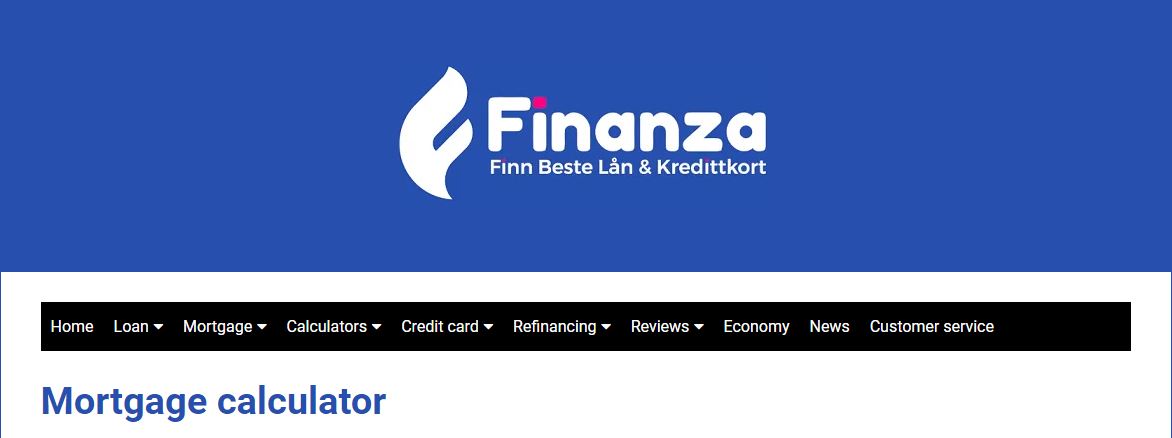When purchasing or refinancing a home, mortgage calculators can help estimate your monthly payments. Utilizing this tool helps you make informed decisions and steer clear of common mortgage mistakes.
Mortgage calculators calculate your monthly payment based on the purchase price, down payment amount, interest rate and other homeowner expenses. They also factor in property taxes, HOA fees and insurance. For further information, take a look at en boliglånskalkulator artikkel by Finanza.
Mortgage Calculator
Mortgage calculators are an indispensable asset for any real estate buyer or renter. They determine if borrowers can afford to buy or rent a home by calculating their monthly mortgage payments and other associated financial costs.
They’re also an excellent tool to determine your payment if you refinance an existing mortgage. The Mortgage Calculator can also assist in calculating how much money you might borrow for your dream home or apartment, taking into account factors like down payment, interest rate, and mortgage term options.
A mortgage calculator estimates the amount you will pay over the life of a loan, which is made up of principal (the loan amount) and interest (the cost of borrowing). It also takes into account other costs associated with buying a home such as property taxes, homeowner’s insurance (if applicable), condo/HOA fees, etc.
These elements can significantly influence the amount you pay for a house, so make sure your mortgage calculator accurately reflects all expenses associated with purchasing a property.
By overestimating your mortgage calculator without factoring in other expenses, you could end up overspending and make a poor decision for your family. By properly calculating how much money you can afford for a house and taking into account all additional costs involved, however, you are much more likely to find the ideal house for your family’s needs.
When using a mortgage calculator, it’s essential to be honest about your finances and credit score. This is especially pertinent if you plan on making a significant down payment – an essential step in buying a home.
Many people dedicate years to saving for their down payment, which can be a substantial commitment. It is essential to consider that the lower your down payment, the more interest you will need to pay back on the home – this could amount to thousands of dollars over time.
Thankfully, there are numerous mortgage calculators available to assist you in selecting the ideal loan for your requirements. You can even use these tools to determine when is the ideal time to buy a home. With these resources at your disposal, finding the perfect house for your family has never been simpler!

Mortgage Payment Calculator
If you’re in the market for a home or looking to refinance your existing mortgage, a mortgage calculator can be invaluable. It will estimate your monthly payment as well as total loan amount and interest rate.
Your mortgage payment consists of both principal and interest, but it also includes other costs that affect your finances. For instance, home insurance and property taxes could make up a considerable part of what you pay each month, while in certain cases your loan may include private mortgage insurance (PMI).
This mortgage calculator can give you an estimate of your monthly payment based on the price of your home, the amount put down and interest rate. It also lets you see how changing variables like credit score, income and down payment affect the result.
One way to save money on your mortgage is by paying off the loan sooner than expected, thus incurring less interest and making fewer payments. There are generally three main strategies for accomplishing this: pay more toward principal each month, make one-time extra payments or combine both strategies.
Mortgage calculators use your income, debt and down payment to estimate how much house you can afford. This is an ideal starting point for many home buyers since it allows them to specify a monthly payment that fits within budget.
Most mortgage calculators begin by taking into account the house price and interest rate, but an advanced mortgage calculator can also take into account your annual income, regular monthly debts, as well as your debt-to-income (DTI) ratio. That way, it becomes simpler to find a home that meets both your budget and DTI goals.
You have the option to include your homeowners insurance, property tax rates, as well as homeowner’s association dues (if applicable) into the calculation. Unfortunately, these factors are often overlooked by homebuyers but can significantly impact how much it costs to own a house.
According to your individual circumstances, you might want to consider using a mortgage amortization schedule when calculating monthly payments. This type of calculator breaks down each payment into manageable monthly amounts and displays how much interest will be paid over time, how long it’ll take to pay off the loan, and any milestones along the way.
Mortgage Prepayment Calculator
The Mortgage Prepayment Calculator is a helpful tool that estimates how much interest you could save by paying off your loan sooner. It takes into account factors like principal amount, interest rate and loan term to calculate savings potential from making extra payments toward your mortgage.
Additionally, it offers you a detailed amortization schedule: this table breaks down all payments into interest and principal over the life of your loan. You may print this schedule out for personal reference.
If you want to pay off your mortgage faster, there are two methods for doing so: put extra cash toward it each month or make a large one-time payment. Doing this can reduce the term of your loan significantly and also save on interest over time.
You may be able to reduce the length of your mortgage loan by making additional payments, such as switching to a biweekly payment plan or adding an supplementary payment to your regular EMI. This strategy could potentially shave six years off if done correctly; however, be sure to research your lender’s policies first since some charge a prepayment fee on these loans.
Mortgage prepayment strategies vary, and ultimately it comes down to personal preference. Consult a professional such as an accountant or banker before making any decisions regarding your payments or prepayment strategy.
This calculator allows you to enter monthly, yearly or one-time prepayments and see how they impact your loan term, interest paid over time and the overall savings from increasing payment frequency. With this data, you can determine how much you can afford to borrow and determine what income level is necessary in order to qualify for certain loan types.
With this calculator, you can compare different loan types and find the one best suited to your needs. For instance, you might opt to buy a new home instead of refinancing. Furthermore, you can compare costs between taking out a fixed-rate, adjustable rate, or interest-only mortgage. Selecting the correct type of mortgage ensures you get maximum value for your money if you plan to remain in your residence long term.
Mortgage Insurance Calculator
The Mortgage Insurance Calculator is a handy tool that estimates how much private mortgage insurance (PMI) you’ll pay based on your credit score and loan-to-value ratio. Additionally, it can determine when certain amounts of equity in your home may allow lenders to waive PMI for FHA loans.
In general, borrowers with lower credit scores must pay more for private mortgage insurance than those with higher ratings. This is because PMI reduces a lender’s risk when they approve loans for those with small down payments.
Debtors with mortgage financing may be able to purchase a home sooner than they otherwise could. Unfortunately, the downside is that they usually end up paying more in the long run due to increased mortgage rates.
Fortunately, borrowers can avoid paying PMI altogether by making a significant down payment or taking out an FHA mortgage. Furthermore, you may qualify for better loan rates using your credit-scoring model (FICO score), which measures credit worthiness.
To use the PMI calculator, enter your down payment amount and purchase price into the provided fields. The tool will then estimate your monthly private mortgage insurance premium based on those figures as well as your loan-to-value ratio.
Once the results are in, you can use them to calculate how much savings you need in order to avoid paying PMI. Moreover, you’ll know when you reach a certain level (usually 20 percent) of equity in your home.
The calculator also generates an amortization schedule, showing how much of each monthly payment goes toward paying off the loan’s principal balance and interest, with some going towards other costs too. This feature comes in handy when applying for a mortgage or reviewing existing mortgage terms.
As a homeowner, you may be worried about homeowners insurance and property taxes. These costs can add up to substantial sums each month. With this calculator, you can calculate your total monthly payments including these items and see how it compares with owning a home.



